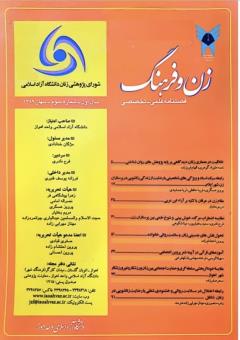تحول نقش های جنسیتی زنان و سلامت روانی خانواده
محورهای موضوعی : پزشکی و بهداشت
1 - عضو هیئت علمی دانشگاه آزاد اسلامی – واحد اهواز
کلید واژه: خانواده, Women, زنان, سلامت روانی, Gender role, نقش های جنسیتی, family sanity,
چکیده مقاله :
هدف از این پژوهش بررسی عوامل تأثیرگذار بر تحول نقش های جنسیتی زنان و آثار مثبت و منفی این تحول نقش، بر سلامت روان خانواده، و همچنین ارائه راهکارهایی جهت کاستن از آثار منفی آن بود. مرور پژوهش های انجام شده در زمینه تحول نقش های جنسیتی نشان داد که تحول نقش در زنان، در کنار دستاوردهای مثبتی چون گسترش نسبی حقوق اجتماعی، افزایش قدرت اقتصادی و سطح تحصیلات آنان، کاهش خشونت خانگی نسبت به زن و افزایش خودباوری و اعتماد به نفس در زنان، منجر به پی آمدهای منفی مانند کاهش حضور زوجین در کنار هم در خانه، افزایش نزاع بر سر قدرت بین زوجین، افزایش رفتار جنسی پرخطر و تا حدودی بالا رفتن سن ازدواج گردید. بررسی اجمالی پدیده های مرتبط با تغییر نقش های جنسیتی زنان، نشان داد که فرهنگ سازی و به کارگیری جدی فرامین اصیل اسلامی در مورد نقش های جنسیتی، تغییر باورهای سنتی نامطلوب در مورد زنان، افزایش سطح تحصیلات آنان،دقت نظر زنان در تنظیم برنامه شغلی به گونه ای که به وظیفه خطیر مادری آنها لطمه نزند، حمایت بیشتر مردان از همسران شاغل خود، و به طور کلی میانه روی در تغییر نقش های جنسیتی، می تواند به عنوان راه هایی برای کاهش اثرات منفی تحول نقش های جنسیتی و در نتیجه حفظ سلامت خانواده در نظر گرفته شوند.
Due to traditional socially constructed beliefs about gender role models and its insidious impact on public attitudes and acceptations, instrumental behavior (dominant, assertive, independent, and competitive) is being associated with men while expressive behavior (kind, nurturing, cooperative, sensitive to others’ needs) considered as femininity. Accumulated prejudice, discrimination and stereotyping caused the superior and inferior gender/ social role attributing and assigning to male and female respectively. Such sex inequalities lead to unfair behavior increasing akin to domestic violence, pushing back women from social practices, destroying their self confidence and so on. While evidences indicate role shifting to more masculine in women than men in changing their traditional role; women benefit some of the positive achievements such as relatively promoted social rights, strengthening economic empowerment, higher educations and self assertiveness increment. However the family suffering from couple’s infrequent home co-presence, home power disputes, single parent family, high risk sexual behaviors as the negative effects of the gender role development. This paper by briefly reviewing such phenomenon; suggested: obeying and comprehensive application of the Islamic original rules (jurisprudence) on gender roles, acceding traditional gender role shifting, more male spouses supporting of women, more precise balanced in-out house tasks management by women themselves; as introducing approaches to eliminate negative consequences of gender role shifting and to sustain family sanity and healthy mentality as well.
_||_


